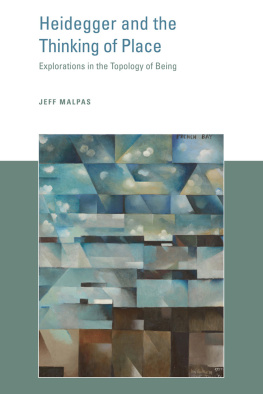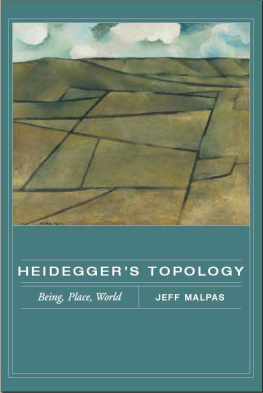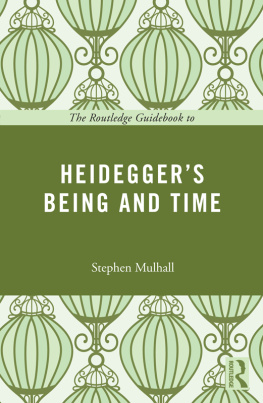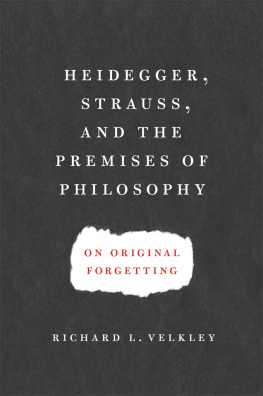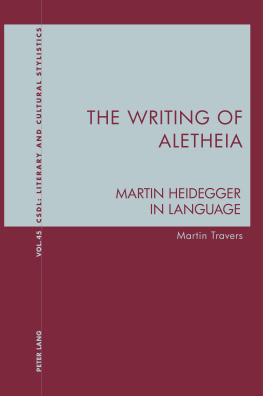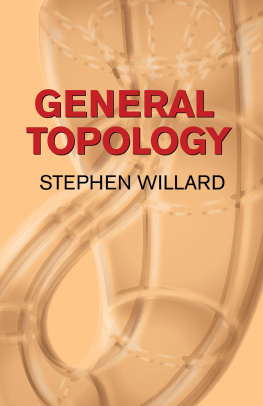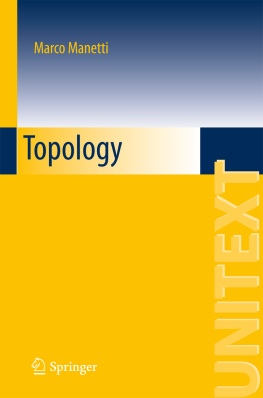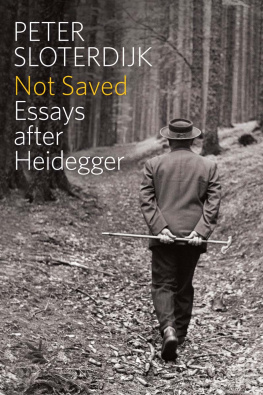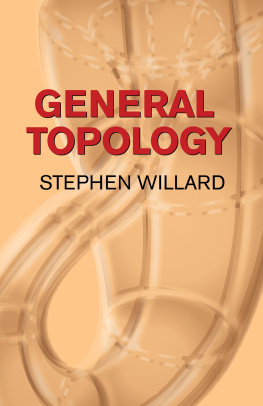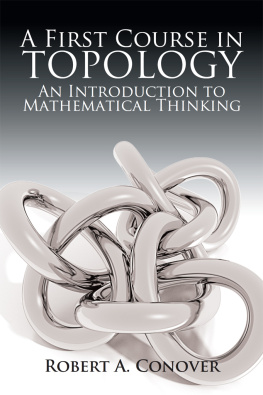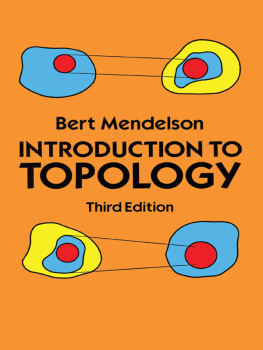Heidegger and the Thinking of Place
Heidegger and the Thinking of Place
Explorations in the Topology of Being
Jeff Malpas
The MIT Press
Cambridge, Massachusetts
London, England
2012 Massachusetts Institute of Technology
All rights reserved. No part of this book may be reproduced in any form by any electronic or mechanical means (including photocopying, recording, or information storage and retrieval) without permission in writing from the publisher.
For information about special quantity discounts, please email .
Library of Congress Cataloging-in-Publication Data
Malpas, Jeff.
Heidegger and the thinking of place : explorations in the topology of being / Jeff Malpas.
p. cm.
Includes bibliographical references and index.
ISBN 978-0-262-01684-1 (hardcover : alk. paper)
ISBN 978-0-262-30075-9 (retail e-book)
1. Heidegger, Martin, 18891976. 2. Place (Philosophy). I. Title.
B3279.H49M2719 2012
193dc23
2011021053
10 9 8 7 6 5 4 3 2 1
We shall not cease from exploration / And the end of all our exploring / Will be to arrive where we started / And know the place for the first time.
T. S. Eliot, Four Quartets (Little Gidding)
Acknowledgments
I would like to thank Philip Laughlin and the team at the MIT Press for their support in bringing this project to fruition. Thanks are also due to the Australian Research Council for providing the fellowship that enabled this work to be completed, as well as the Alexander von Humboldt Foundation for their continuing support over a decade or more.
There are many friends and colleagues who have contributed in various ways to the ideas set out here, but I would particularly like to thank Bernardo Ainbinder, Andrew Benjamin, Miguel de Bestegui, Andrew Brennan, Chan-Fai Cheung, Steve Crowell, Stuart Elden, Ingo Farin, Hans-Helmuth Gander, Laurence Hemming, Norelle Lickiss, Linn Miller, Dermot Moran, James Phillips, Edward Relph, Glenda Satne, Ligia Saramago, David Seamon, Lucy Tatman, Lubica Ucnik, Jin Xiping, Julian Young, and Gnter Zller. I am also grateful for the continuing support of the School of Philosophy at the University of Tasmania, and especially the help of Irene Sawford, as well as Bronwyn Peters and Sally Laing.
I would like to thank the original publishers for allowing me to make use of the following material:
The Place of Topology: Responding to Crowell, Bestegui, and Young, International Journal of Philosophical Studies 19 (2011): 305325 (chapter 3); and Heidegger in Benjamins City, Journal of Architecture, 12 (2007): 489499 (chapter 11)both with kind permission of the publisher, Taylor & Francis Ltd., http://www.informaworld.com.
From the Transcendental to the Topological: Heidegger on Ground, Unity, and Limit, in From Kant to Davidson: Philosophy and the Idea of the Transcendental, ed. Jeff Malpas (London: Routledge, 2002) (chapter 4); Objectivity and Self-Disclosedness: The Phenomenological Working of Art, in Art and Phenomenology, ed. Joseph Parry (London: Routledge, 2010) (chapter 12); Death and the Unity of a Life, in Death and Philosophy, ed. J. E. Malpas and Robert C. Solomon (London: Routledge, 1998) (chapter 12); and Beginning in Wonder, in Philosophical Romanticism, ed. Nikolas Kompridis (London: Routledge, 2006) (epilogue)all with kind permission of Routledge and the Taylor & Francis Group.
Nihilism and the Thinking of Place, in The Movement of Nihilism, Laurence Paul Hemming and Bogdan Costea (London: Continuum, 2010) (chapter 5), with kind permission of the Continuum International Publishing Group.
Heidegger, Space, and World, in Heidegger and Cognitive Science, ed. Julian Kiverstein and Michael Wheeler (London: Palgrave-Macmillan, 2010) (chapter 6), with kind permission of Palgrave Macmillan.
Heidegger, Geography, and Politics, Journal of the Philosophy of History 2 (2008): 185213 (chapter 7); and Philosophys Nostalgia, in Philosophys Moods: The Affective Grounds of Thinking, ed. Hagi Kenaan and Ilit Ferber (Dordrecht: Springer, 2011) (chapter 8)both with kind permission of Springer Verlag.
Locating Interpretation: The Topography of Understanding in Heidegger and Davidson, Philosophical Topics 27 (1999): 129148 (chapter 10) (1999 University of Arkansas, http://www.uapress.com), with kind permission of the University of Arkansas Press.
Last, but by no means least, I would like to acknowledge, and express my thanks for, the continuing love and support of my wife, Margaret, without which neither these essays, nor much else besides, would have been possible.
Introduction: The Thinking of Place
Accordingly, we may suggest that the day will come when we will not shun the question whether the opening, the free open, may not be that within which alone pure space and ecstatic time and everything present and absent in them have the place which gathers and protects everything.
Martin Heidegger, The End of Philosophy and the Task of Thinking, in On Time and Being
The idea of placeof toposruns through the thinking of Martin Heidegger almost from the very start. Although not always directly thematizedsometimes apparently obscured, displaced even, by other conceptsand expressed through many different terms (Ort, Ortschaft, Sttte, Gegend, Dasein, Lichtung, Ereignis),
Heideggers work exemplifies the practice of what might be thought of as philosophical topology, yet Heidegger must also be counted as one of the principal founders of such a mode of place-oriented thinking. The essays collected here (essays that span a decade or more of writing) thus focus on the idea of place, first, as it appears in Heideggers thinking as it arises in a number of ways and in relation to a range of issues, and, second, as it can be seen to provide the focus for a distinctive mode of philosophical thinking that encompasses, but is not restricted to, the Heideggerian.
In this respect, the focus on place that appears here, while certainly finding a fruitful setting in Heideggers work, does not derive from a Heideggerian perspective alone. It is not that, taking Heidegger as a starting point, the idea of place as philosophically significant comes into view, but rather, beginning with the idea of place as philosophically significant, one comes to a different reading, and perhaps a different appreciation, of the thinker from Messkirch, as well as of a number of other key figuresmost notably perhaps, Kant, Aristotle, Gadamer, and Davidson, but also Benjamin, for instance, and, although they make but the briefest of appearances here, Arendt and Camus. The idea that place should be philosophically so significant in this waythat it might actually be central to philosophy as such (and that it is so is the underlying claim throughout much of my work as well, I would argue, of Heideggers)is to some extent a claim defended and elaborated upon, in various ways, throughout the essays contained here, but it is perhaps worth saying a little more by way of such a defense or elaboration from the very start. What underpins my conviction concerning the philosophical centrality of place, not only in Heidegger, but also more generally, is something that involves both a philosophical idea as well as a matter of personal experience or personal phenomenology. I will say a little about the personal element that is at issue here, but first let me address the philosophical.
One of the features of place is the way in which it establishes relations of inside and outsiderelations that are directly tied to the essential connection between place and boundary or limit. If we are to take the primary datum for philosophy to be our own being-in-the-world (a datum that is not first given in terms of an encounter with consciousness, with sense data, or with any other such derivative notion, but rather first presents itself precisely as an encounter in which self, other, and world are given together as a single unitary phenomenon), then where philosophical inquiry must begin is indeed with place or placedness, since this is fundamentally what is already at issue in the phenomenon of being-in-the-world. Although Aristotles mode of thinking operates within a very different vocabulary and frame, his own emphasis on the importance of
Next page
